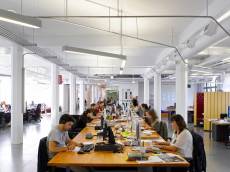May 23, 2013
New report offers latest evidence of link between office design and productivity
 So, does workplace design have any impact on productivity and business performance? Well duh. So why are we still trying to convince managers when there is so much evidence and experience to prove it. The latest study to demonstrate the link builds on decades of research and adds further compelling evidence in a debate that should have been over a long time ago. In this report, workplace strategist Nigel Oseland and the Atomic Weapons Establishment’s estate masterplanner Adrian Burton describe their research quantifying the effect on worker performance of improvements to the office environment. The question these reports always beg is why the argument still has to be made.
So, does workplace design have any impact on productivity and business performance? Well duh. So why are we still trying to convince managers when there is so much evidence and experience to prove it. The latest study to demonstrate the link builds on decades of research and adds further compelling evidence in a debate that should have been over a long time ago. In this report, workplace strategist Nigel Oseland and the Atomic Weapons Establishment’s estate masterplanner Adrian Burton describe their research quantifying the effect on worker performance of improvements to the office environment. The question these reports always beg is why the argument still has to be made.






















May 23, 2013
Guidance on designing in accessibility for disabled workers
by Pam Loch • Comment, Facilities management, Knowledge, Legal news, Workplace design
The government launches a campaign today using TV celebrities and disabled groups to help promote positive role models for disabled people. It’s aimed at building on the latest stats that show 81 per cent of people thought the Paralympics had a positive impact on the way disabled people are perceived. Currently they’re not well represented in the workplace, as according to DTI figures half of all disabled people are unable to find work. This is why the Equality Act 2010 plays such a vital role in promoting diversity in the workplace. Put into practice, understanding and adhering to the Equality Act 2010 requires employers to take positive action to remove certain disadvantages to disabled people posed by working practices and the physical features of premises. (more…)